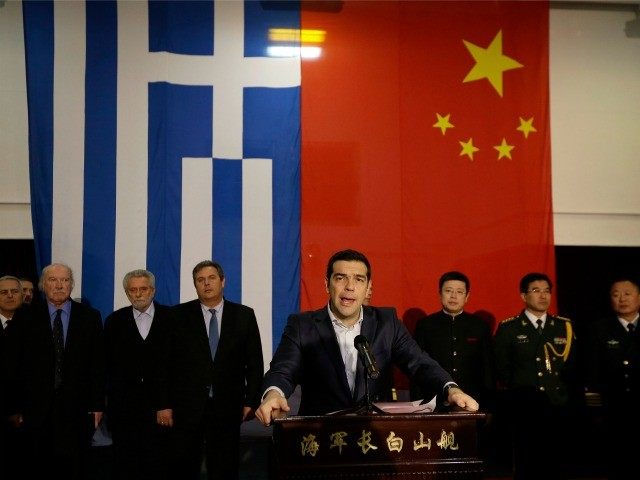In what was received as a pleasant surprise by the European Union, Greece made its first 460 million euro payment to the IMF this week. The Mediterranean country continues to struggle with generating enough revenue to pay off their multi-billion-dollar debt, and one major international player looking to capitalize on their need for business is China.
China has, understandably, played a relatively minor role in the unfolding drama between the new leftist Greek government and the EU, particularly Germany. Its biggest business interest in the nation, however, is about to grow significantly: Piraeus, Europe’s largest passenger port, whose piers were privatized in the aftermath of the Greek economic crisis and now set to be sold in its majority to the China Ocean Shipping Company (COSCO). Greece expects the sale to net them around 500 million euros.
An extensive profile in Germany’s Der Spiegel of China’s operations in Piraeus tells a tale of mutual interests an contradictions in the radical left Syriza Party’s campaign promises versus their actual governing policy. Syriza’s leader, Prime Minister Alexis Tsipras, announced that Greece’s majority share in Piraeus is up for sale, and Cosco is expected to win that bid—not just because it has the money to make the largest payment, but because it has spent years establishing operations far superior in output to the native Greek shipping companies’s efforts.
Der Spiegel spoke to Cosco’s chief executive in Piraeus, Fu Cheng Qui, who appears extremely optimistic on the deal. Fu claims that Cosco’s role in Piraeus grew for two reasons: their workers simply did more work in less time than competitors, and the company hired almost exclusively Greek workers, stemming fears that a Chinese takeover would put Greeks out of jobs in an economy with 26 percent unemployment.
“We are simply twice as fast. We can now complete 36 container movements per hour, and time is money,” Fu says, telling the report to look at the nearest competitor: “Look, Pier I is almost empty. That’s very sad.”
Controlling Piraeus would give China an unprecedented foothold in Europe, but could be one of a number of keys to strengthening the Greek economy. Right now, Tsipras appears to be trying every possible tactic to generate revenue and ensure Greece does not default on its debt to the EU. On a trip to Moscow this week, Greece promised European leaders that they would not ask for loans from Russia to pay back Europe, assuaging some fears that a hard line on the Greek debt would lead to greater Russian influence in the region. “Greece is not a beggar,” Tsipras ensured. Putin confirmed that they spoke exclusively of trade dealings—which may very well result in generating revenue for the Greek economy—but borrowing money did not come up.
In addition to looking for trade with Russia, the leftist Greek government continues to pester Germany for World War II reparations. Greece put a concrete price tag for the first time this week on the amount of money they claim Germany still owes from the era of Nazi occupation of Athens: 279 billion euros. This would conveniently pay off the entire debt to Europe and leave Greece millions to spare for rebuilding infrastructure and social programs.
Receiving reparations for World War II damages does not appear probable at this time, but increased trade with Russia and China are definitely on the horizon. Der Spiegel notes, however, that both sides in the Piraeus deal still have reservations.
On the Greek side, workers have been accusing Cosco of violating their rights for years. Workers claim the company has covered up workplace accidents and forces employees to work unmanageable hours on the job. While asserting that he was still a “socialist,” Fu replied to these criticisms by dismissing unions as representatives of the lazy:
“The union leaders promise their members more money for less work,” he says. “How is that supposed to work? If you want a higher salary you first need to work hard. Not lie on the beach and drink beer. Learn from the Germans! Work hard, never be lazy and always work seriously. Hard work — happy life.”
Other bidders remain in consideration to buy Greece’s majority share in Piraeus—companies from Europe, the United States, and elsewhere. But few can argue they have the sort of infrastructure in place in the port city that Cosco has, and most expect the company to win the bid. While this may stave off a Greek debt default and keep Russia from an attempt to further influence eastern Europe, introducing a wildcard player like China to the drama unfolding around Athens may tip the scales in unpredictable directions.

COMMENTS
Please let us know if you're having issues with commenting.